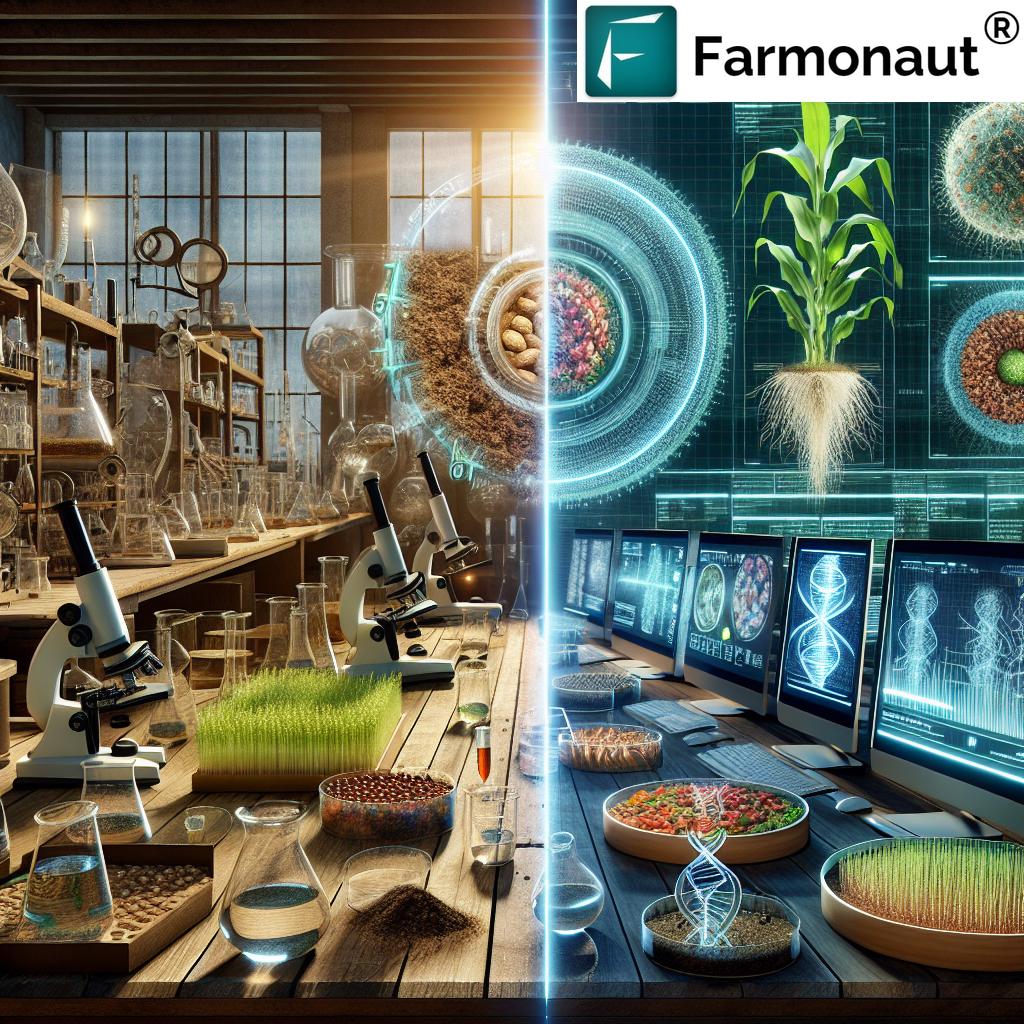Advancing Crop Science: CSSA’s Initiatives for Sustainable Agriculture in America

“The Crop Science Society of America (CSSA) addresses over 10 critical agricultural issues, including climate change and soil science innovations.”
In the ever-evolving landscape of American agriculture, the Crop Science Society of America (CSSA) stands as a beacon of innovation, research, and sustainable practices. As we delve into the intricate workings of this prestigious organization, we’ll explore how CSSA is shaping the future of crop science and driving advancements in agricultural research and education. From cutting-edge precision agriculture technology to groundbreaking soil science innovations, CSSA is at the forefront of transforming farming practices across the United States.
The CSSA: A Pillar of Agricultural Excellence
Founded with the mission to foster the transfer of knowledge of crop science and promote opportunities for our members to succeed, the Crop Science Society of America has become an indispensable resource for professionals in the field. With a focus on sustainable farming practices and crop yield optimization, CSSA plays a pivotal role in addressing the challenges faced by modern agriculture.
Our organization is structured to maximize impact across various domains of crop science. Let’s take a closer look at some of the key committees and initiatives that drive our work:
| Committee Name | Primary Focus | Key Initiatives |
|---|---|---|
| ACS – Encompass Fellows and Scholars Working Group | Promoting diversity and inclusion in crop science |
– Mentorship programs for underrepresented groups – Scholarships for diverse candidates – Inclusive research collaboration initiatives |
| Climate Change and Agriculture Committee | Addressing the impacts of climate change on crop production |
– Development of climate-resilient crop varieties – Research on adaptive farming techniques – Policy recommendations for climate-smart agriculture |
| Precision Agriculture Technology Committee | Advancing the use of technology in farming |
– Integration of AI and machine learning in crop management – Drone technology for crop monitoring – Development of smart irrigation systems |
| Soil Science Innovations Working Group | Improving soil health and fertility |
– Research on soil microbiome enhancement – Development of sustainable soil management practices – Soil carbon sequestration techniques |
These committees form the backbone of our organization, driving research, policy, and educational initiatives that shape the future of American agriculture. By fostering collaboration among crop science professionals, we ensure that the latest advancements are quickly translated into practical applications for farmers and agribusinesses across the country.
Precision Agriculture: The Future of Farming
One of the most exciting areas of focus for CSSA is precision agriculture technology. This innovative approach to farming is revolutionizing how we grow crops, manage resources, and maximize yields. By leveraging data-driven insights and cutting-edge tools, precision agriculture is helping farmers make more informed decisions and optimize their operations.
At the forefront of this technological revolution is Farmonaut, a company that aligns perfectly with CSSA’s mission to advance crop science and promote sustainable agriculture. Farmonaut offers satellite-based farm management solutions that provide real-time crop health monitoring, AI-based advisory systems, and resource management tools.
The integration of such advanced technologies in farming practices is a testament to the rapid progress being made in crop science. CSSA actively promotes the adoption of these technologies through our educational programs, conferences, and publications, ensuring that American farmers have access to the latest tools and knowledge to improve their productivity and sustainability.
Sustainable Farming Practices: A Core Focus
Sustainability is at the heart of CSSA’s mission. We recognize that the future of agriculture depends on our ability to produce more food while minimizing environmental impact. Through our various initiatives and research programs, we are committed to developing and promoting sustainable farming practices that protect our soil, water, and air while ensuring food security for future generations.
Some key areas of sustainable agriculture that CSSA is actively working on include:
- Conservation tillage techniques
- Cover crop implementation
- Integrated pest management
- Water-efficient irrigation systems
- Organic farming methods
By focusing on these areas, we aim to help farmers reduce their environmental footprint while maintaining or even improving crop yields. This approach not only benefits the environment but also helps farmers reduce input costs and improve long-term soil health.
“CSSA’s ACS – Encompass Fellows and Scholars Working Group promotes diversity across 5+ areas of crop science research and education.”
Climate Change and Agriculture: Adapting for the Future
Climate change poses one of the greatest challenges to modern agriculture. As temperatures rise and weather patterns become more unpredictable, farmers must adapt their practices to ensure continued productivity. CSSA is at the forefront of research and policy development to address these challenges.
Our Climate Change and Agriculture Committee works tirelessly to:
- Develop climate-resilient crop varieties
- Research adaptive farming techniques
- Provide policy recommendations for climate-smart agriculture
- Educate farmers on best practices for climate adaptation
Through these efforts, we aim to equip American farmers with the knowledge and tools they need to thrive in a changing climate. This work is crucial not only for the future of agriculture but also for global food security.
Soil Science Innovations: The Foundation of Crop Health
Healthy soils are the foundation of productive agriculture. CSSA’s Soil Science Innovations Working Group is dedicated to advancing our understanding of soil health and developing new techniques to improve soil fertility and structure. This work is essential for sustainable crop production and long-term agricultural sustainability.
Some of the cutting-edge areas of soil science that we’re focusing on include:
- Soil microbiome research
- Biochar applications for soil improvement
- Precision soil mapping and analysis
- Soil carbon sequestration techniques
By advancing our knowledge in these areas, we’re helping farmers make more informed decisions about soil management, leading to healthier crops and more sustainable farming practices.
Education and Professional Development: Nurturing the Next Generation
At CSSA, we believe that education and professional development are key to advancing crop science and ensuring a bright future for American agriculture. Our organization offers a wide range of educational resources and opportunities for both students and professionals in the field.
Some of our key educational initiatives include:
- Undergraduate and graduate scholarships
- Mentorship programs
- Online courses and webinars
- Annual conferences and workshops
- Peer-reviewed journals and publications
Through these programs, we aim to nurture the next generation of crop scientists and provide ongoing support for professionals throughout their careers. By investing in education, we’re ensuring that American agriculture remains at the forefront of innovation and sustainability.
Crop Science Conferences: A Hub for Innovation
CSSA organizes several crop science conferences throughout the year, providing invaluable opportunities for researchers, farmers, and industry professionals to share knowledge, network, and collaborate. These events serve as a hub for innovation, where the latest research findings are presented, and new ideas are born.
Our flagship events include:
- The Annual Meeting: A comprehensive conference covering all aspects of crop science
- The Sustainable Agronomy Conference: Focused on the latest in sustainable farming practices
- The Precision Agriculture Summit: Showcasing cutting-edge agricultural technologies
These conferences not only facilitate knowledge exchange but also help shape the future direction of crop science research and policy. They’re an essential part of our mission to advance the field and promote sustainable agriculture in America.
Policy and Advocacy: Shaping the Future of Agriculture
CSSA plays a crucial role in shaping agricultural policy at both the state and federal levels. Our policy and advocacy efforts focus on promoting science-based decision-making and ensuring that the needs of farmers and crop scientists are represented in legislative discussions.
Key areas of our policy work include:
- Farm bill recommendations
- Research funding advocacy
- Environmental regulations
- International trade policies
By engaging with policymakers and providing expert testimony, we help ensure that agricultural policies are grounded in sound science and support the long-term sustainability of American farming.
Embracing Technology: The Role of Agritech Solutions
As we look to the future of agriculture, it’s clear that technology will play an increasingly important role. CSSA is committed to promoting the adoption of innovative agritech solutions that can help farmers improve productivity, reduce environmental impact, and adapt to changing conditions.
One such solution that aligns with our mission is Farmonaut’s satellite-based farm management platform. This technology offers farmers valuable insights into crop health, soil moisture, and other critical factors, enabling more precise and efficient farming practices.
Explore Farmonaut’s solutions:
By promoting the integration of such technologies, CSSA is helping to bridge the gap between cutting-edge research and practical applications on the farm. This approach is essential for addressing the complex challenges facing modern agriculture and ensuring a sustainable food supply for future generations.
The Future of Crop Science: Challenges and Opportunities
As we look ahead, the field of crop science faces both significant challenges and exciting opportunities. Climate change, population growth, and resource scarcity will continue to put pressure on agricultural systems. However, advancements in technology, genetics, and sustainable practices offer hope for overcoming these challenges.
Some of the key areas that CSSA will be focusing on in the coming years include:
- Gene editing and advanced breeding techniques
- AI and machine learning in crop management
- Vertical farming and urban agriculture
- Regenerative agriculture practices
- Plant-based protein development
By staying at the forefront of these emerging trends and technologies, CSSA will continue to play a vital role in shaping the future of agriculture in America and beyond.
Conclusion: A Sustainable Future Through Crop Science
As we’ve explored throughout this blog post, the Crop Science Society of America is at the forefront of advancing sustainable agriculture in America. Through our diverse initiatives, from precision agriculture technology to climate change adaptation, we’re working tirelessly to ensure a bright future for American farming.
By fostering collaboration, promoting education, and driving innovation, CSSA is helping to create a more resilient, productive, and sustainable agricultural sector. As we face the challenges of the 21st century, the work of crop scientists has never been more critical.
We invite you to join us in this important mission. Whether you’re a farmer, researcher, student, or simply someone passionate about sustainable agriculture, there’s a place for you in the CSSA community. Together, we can build a future where crop science continues to drive progress, ensuring food security and environmental stewardship for generations to come.

FAQ: Crop Science Society of America and Sustainable Agriculture
Q: What is the primary mission of the Crop Science Society of America (CSSA)?
A: The primary mission of CSSA is to foster the transfer of knowledge of crop science and promote opportunities for our members to succeed in advancing sustainable agriculture in America.
Q: How does CSSA contribute to sustainable farming practices?
A: CSSA contributes to sustainable farming practices through research, education, and policy advocacy. We focus on areas such as precision agriculture, soil health, climate-resilient crops, and resource-efficient farming techniques.
Q: What role does technology play in CSSA’s initiatives?
A: Technology plays a crucial role in CSSA’s initiatives. We promote the adoption of precision agriculture technologies, AI-driven crop management systems, and satellite-based monitoring tools to enhance farm productivity and sustainability.
Q: How does CSSA address climate change in agriculture?
A: CSSA addresses climate change through dedicated research on climate-resilient crop varieties, adaptive farming techniques, and policy recommendations for climate-smart agriculture. Our Climate Change and Agriculture Committee leads these efforts.
Q: What educational opportunities does CSSA offer?
A: CSSA offers a wide range of educational opportunities, including scholarships, mentorship programs, online courses, webinars, annual conferences, and access to peer-reviewed publications in crop science.
Q: How can professionals in the agricultural sector benefit from CSSA membership?
A: CSSA membership provides access to cutting-edge research, networking opportunities, professional development resources, and the chance to contribute to shaping the future of crop science and sustainable agriculture in America.






